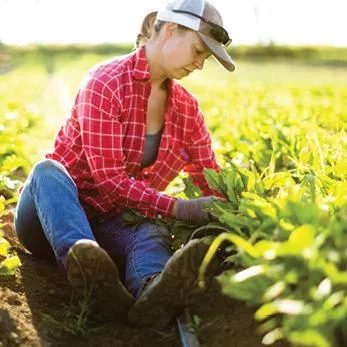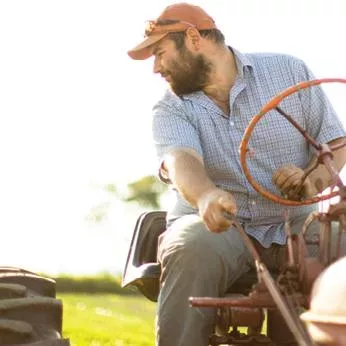
Next Step Grant Update: Boldly Grown Farm
Earlier this year, the Co-op Farm Fund, with support from the Sustainable Whatcom Fund of Whatcom Community Foundation, launched the Next Step Project.
The project was able to direct $25,500 in grants to six local farms scaling up to supply the local wholesale market.
One of those farms is Boldly Grown Farm in Skagit Valley.
Boldly Grown Farm is one of 14 farms operating at Viva Farms (a nonprofit small-business farm incubator in Skagit Valley). Its current focus is growing storage crops—winter squash, carrots, beets, cabbage, onions, and more—to extend the availability of local food into the winter months. It also grows flowers for sale and to provide pollinator habitat. In future years, Boldly Grown Farm plans to incorporate grains and pastured poultry, creating a diverse and resilient farm system.
Boldly Grown Farm was founded in 2015 by husband-and-wife team Jacob Slosberg and Amy Frye. Both have personal relationships to farming—Amy grew up next door to her grandparent’s farm in Minnesota and Jacob discovered his love of farming on a tenth grade trip to Costa Rica. The couple met at the Centre for Sustainable Food Systems at the University of British Columbia where Jacob was in charge of managing all the annual vegetables and pasture-raised poultry and Amy was the Director.
Given their complementary skill-sets, they experienced a very strong start in their first year of farming; harvesting 20,000 pounds of food from one acre. There were many hits and one miss along the way—carrots were wildly successful and they couldn’t keep up with demand, while onions got in the ground too late and mostly fizzled out.
The couple had a strong network of friends and family who pitched in to help the startup farm. During the final carrot harvest in mid-December, Amy and Jacob, along with several farmer friends, found themselves working late into the night, calf-deep in mud, taking turns getting stuck and helping pull each other out of the muck. “There may have been a good amount of both cursing and laughing involved. This year, I’m sure, will have its own successes and challenges—it’s a constant learning process. Farming is very humbling in that way.” said Amy.
From the beginning, Jacob and Amy identified a niche market in the demand for extended season local produce.
Don’t we all long for flavorful, local, organic produce in the winter months? This past season they harvested carrots into December and cabbage into January. With other crops like beets and winter squash in storage from earlier in the year, they were providing produce through mid-February before selling out.
For the 2016 growing season, the couple added an additional two acres, which will triple the farm’s production and allow for more diversification and trialing a small amount of hoop-house crops such as heirloom tomatoes, purple globe eggplant, and red peppers. “We are passionate and ambitious! We want to feed a lot of people and ensure that a greater portion of the population has ready access to healthy and sustainably grown produce,” said Amy.
Next Step grant funds will be used to purchase a rinse conveyor
Next Step grant funds will be used to purchase a rinse conveyor that will improve efficiency of washing root crops, such as carrots and beets, and can also be used for hydrocooling crops like broccoli (an important step for storage and shelf life). The conveyor soaks roots before washing so they only need to go through the system once, thereby increasing efficiency and saving labor. The conveyor’s recirculation system will also reduce water use.
Boldly Grown is a perfect example of the farms the Next Step Project was created for—farms that are ready to take the next step to scale up for the wholesale market, but need assistance with a specific input to make the leap.

On Jacob and Amy’s farm it was the purchase of the rinse conveyor; other Next Step farms are using funds to invest in packing and processing facilities, purchase a refrigerated delivery vehicle, and expand crop diversity with new harvest equipment.
The Co-op is thrilled to launch this new program and watch as more local farms take the Next Step to meet demand for even more local, sustainable, organic food.
Learn more at boldlygrownfarm.com and follow Boldly Grown Farm on
Facebook and Instagram.